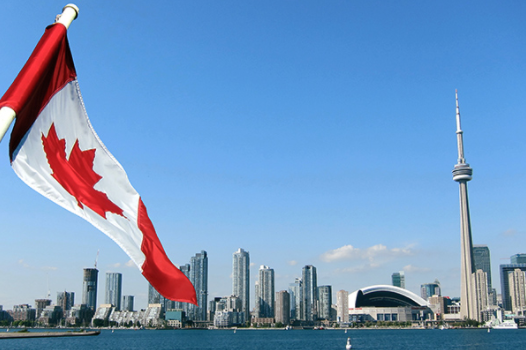
Exporting to Canada – Overview
Canada is a stable economy in North America, consistently ranked as a top GDP country globally. This economic stability presents promising opportunities for companies exporting to Canada.
Canada is considered one of the easiest countries to do business with a stable government, a strong rule of law, and an effective regulatory system. Canada’s population is 38 million, with 24% under 25 (CIA Factbook).
Due to its proximity to the U.S. and Mexican markets, Canada is an attractive export market. Its major industries include manufacturing, mining, oil and gas, construction, and finance, with a dominant services-based economy and leadership in G7 economic growth.
Exporting to Canada offers further benefits, as Canada has trade agreements with the European Union through CETA and is part of the USMCA, the successor to NAFTA.
Canada’s Business Culture
Canada is generally an easy market for conducting business. Its relaxed and approachable business culture emphasizes long-term relationships. Building rapport through face-to-face meetings is highly valued, facilitating smoother business transactions in Canada.
While officially bilingual, English predominates in business outside Québec, where French is the language of business as mandated by provincial law. If one does not speak French fluently, an interpreter may be necessary for meetings in Québec.
Always specify the currency (U.S. or Canadian dollars) when quoting prices to prevent misunderstandings.
Setting up in Canada
Canada’s stable economy, banking system, and proximity to the U.S. make it an attractive market for North American expansion. Companies interested in setting up in Canada can visit Canada’s Trade Commissioner Service for information.
The use of agents or distributors is common, but due to Canada’s vast land area, agents should be located near potential customers.
Direct exports to Canada are viable, especially for e-commerce or responding to direct inquiries from Canadian businesses.
Banking and Finance
Canada’s legal tender is the Canadian dollar (CAD). The Canadian banking system is renowned for its stability and regulation, consistently ranking among the top in the world for soundness (source).
Canadian banks have an extensive network, with over 6,000 branches and 18,000 ATMs across the country.
Tariffs and Non-Tariff Barriers
Tariff
For most products, Canadian importers are not required to apply for an import license. The Canada Border Services Agency (CBSA) provides a list of required documents for imports. It’s beneficial to check if Canada has signed any trade agreements with your country, as detailed in the CBSA’s trade agreements page.
Non-Tariff Barriers
Certain goods cannot be imported into Canada. Check the CBSA’s prohibited import list to ensure compliance.
Products must meet Canadian safety standards, be clearly labelled, and include warnings. The Standards Council of Canada (SCC) oversees Canada’s National Standards System, ensuring products adhere to national standards.
Product Certification, Labeling, and Packaging
Canada’s Consumer Packaging and Labelling Act mandates bilingual (English and French) labels on consumer goods, detailing product identity, net quantity, and dealer information.
The Canadian Food Inspection Agency (CFIA) regulates food imports, and its Food Labelling for Industry page provides specific guidance for food product labelling.
Canada uses the metric system for units of measure.
Methods of Quoting and Payment
Quotes should generally be in Canadian dollars and based on CIF (Carriage, Insurance, and Freight) terms unless otherwise specified. Typical payment terms range from 30 to 90 days, with discounts offered for early payments within 10 days of the invoice date.
For new clients, it’s prudent to exercise standard caution and establish safeguards until a business relationship is firmly established.
Documentary & Clearance Requirements
The CBSA provides guidelines for required documents when importing goods into Canada. Generally, you’ll need:
- Two copies of the invoice
- Two copies of the cargo control document (CCD)
- Two copies of Form B3 (Canada Customs Coding Form)
- Any necessary permits, health certificates, or certificates of origin
A Canada Customs Invoice (CCI) is required for shipments over CAD 1,600 FOB value.
For food products, the CFIA mandates an Import Declaration with shipment details.
Customs Process
All shipments to Canada must be reported to CBSA upon arrival at the Canadian port of entry. This is done via a manifest/cargo control document (CCD) or CBSA’s Electronic Data Interchange (EDI) System. For fresh produce, a Confirmation of Sale form from the CFIA may be required to confirm a firm purchase agreement.
Business Risks in Canada
Companies must adhere to high corporate standards, understanding Canada’s legal landscape and the penalties associated with bribing foreign officials.
Intellectual Property Protection
Intellectual property (IP) in Canada includes trademarks, patents, designs, and copyright. So, the Canadian Intellectual Property Office (CIPO) oversees these, and registration can be completed online through CIPO.
Dispute Resolution
Canada’s legal system allows for commercial dispute settlement, but this can be a lengthy and costly process. The Canadian Department of Justice offers Alternative Dispute Resolution (ADR) as an option for settling disputes.
Canada Web Resources
About the Author
So, Aidan Conaty is the founder of TCI China & Goodada. Goodada Inspections provides Quality Control Inspections across Canada. Therefore, if you require third-party inspections in Canada, please visit our Canada Inspections page; otherwise, you can contact Aidan using the details below.
Contact Person: Aidan Conaty
Mobile- Messenger (Click to Connect)
Laptop / PC (Click to Connect)
Phone:(Europe/ Rest of the World) +353 1 885 3919 ; (UK) +44.020.3287.2990 ; (North America) +1.518.290.6604


